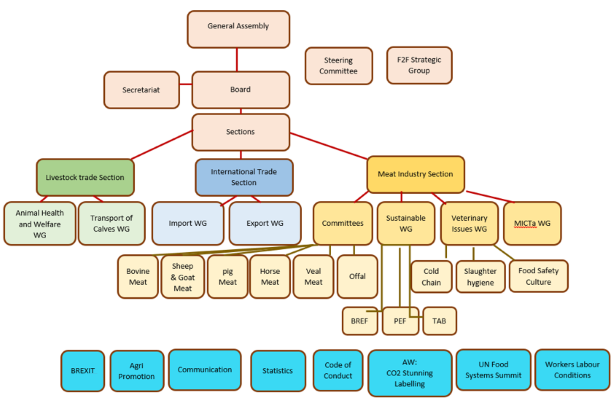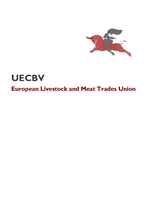AEMB
UECBV secretariat coordinates the work of its experts through sections and committees tackling meat industry, international trade and livestock issues.
When required, an EU meat sector expert working group can draft a position paper on key issues which, once approved, are communicated to European and international decision-makers aiming at shaping legislative and non-legislative developments impacting on the industry.
UECBV is an active member of EU civil dialogue groups. UECBV addresses the EU meat sector interests through eight themes: agriculture, health and consumers, trade, industry and EU funded research projects, climate change and environment, competition, social affairs and customs union and indirect taxation.
All Sections/Committees/Working groups are open to all UECBV members.
UECBV counts three sections

When required, an EU meat sector expert working group can draft a position paper on key issues which, once approved, are communicated to European and international decision-makers aiming at shaping legislative and non-legislative developments impacting on the industry.
UECBV is an active member of EU civil dialogue groups. UECBV addresses the EU meat sector interests through eight themes: agriculture, health and consumers, trade, industry and EU funded research projects, climate change and environment, competition, social affairs and customs union and indirect taxation.
All Sections/Committees/Working groups are open to all UECBV members.
UECBV counts three sections

| Sections and working groups |
6 Items
Page 1/1




The joint UECBV-CLITRAVI “Meat sector TaskForce on Sustainability” (MSTS) was officially launched in November 2009 with the aim to allow a debate among experts and to facilitate a fruitful dialogue within the European meat sector. The UECBV working group aims at providing an EU meat sector to EU's action related to Sustainable Consumption and Production. The group counting around 10 experts has meets at minimum twice a year with purpose to address every concern related to the sustainability in the meat chain with a case-by-case approach and sticking to a scientific, knowledge-based approach. At international level, the TaskForce has been coordinating a fruitful cooperation with the Food and Agriculture Organization of the United Nations (FAO) dealing with sustainable livestock. Main goal of the TaskForce's experts is to contribute to a better estimation of the EU livestock environmental performance carried out by the FAO scientists. Activity October 2010, the TaskForce issued an EU livestock-meat sector position paper on the environmental challenges. July 2012, launch of a public-private partnership on the environmental benchmarking of livestock supply chains, coordinated by the FAO Animal Production and Health Division (AGA). The EU red meat sector, along with other world area counterparts, joined forces under the heading of the IMS - International Meat Secretariat - which is active in the development of this FAO multi-stakeholder partnership on named LEAP. The Livestock Environmental Assessment and Performance (LEAP) Partnership focuses on the development of recognised sector specific guidelines to assess environment performance of livestock supply chains. It is a multi-stakeholder partnership of Governments, Private Sectors, NGOs and other stakeholders. Additional information on its creation can be found HERE while a progress report of the last three years of activities (2013-2015) is available HERE. Learn more about this partnership involving the International Feed Industry Federation (IFIF), the International Dairy Federation (IDF), the International Meat Secretariat (IMS), the International Federation for Animal Health (IFAH), the International Federation of Agricultural Producers (IFAP) and the International Poultry Council (IPC), consulting the FAO website here. May 2014, the PEF (Product Environmental Footprint) meat project has been selected by the EU Commission among the proposals submitted in order to lead the process of developing the PEF Category Rules (CRs). An international project consortium led by UECBV is working on the establishment of EU CRs for beef, pork and lamb meat. The RED MEAT PEF PILOT project creates synergies between operators working in and outside the EU border. Currently, the project sees the support of meat industry representatives directly involved in the MSTS activities (NL, FR, IE, DK, UK) and some relevant third countries (in terms of business and knowledge about the LCA -Life Cycle Assessment- approach: New Zealand and Australia). These 3 identified partners (Australia/EU/New Zealand) are sharing the cost of the project, while the UECBV secretariat is acting to bear the bulk of administrative coordination. SEE PROJECT FACT SHEETS: HERE & HERE.
The trade of domestic animals is the source of UECBV. The restructuring of farms and of the meat industry has contributed to the development of this trade whose key is a safe medical environment and the strict compliance with the animal welfare regulations. The section of livestock trade brings together experts from the national federations of livestock traders and livestock markets. The section members meet three to four times a year, under the chairmanship of Mr Heinz Osterloh. The working group goal is to follow, update, discuss, exchange information and prepare UECBV positions on livestock related issues, such as Animal Health (e.g. Animal Health Law, diseases and disease outbreaks in the EU and in neighboring countries), Animal Welfare (e.g. protection of animal during transport, at the farms, EU animal welfare strategy), Intra Community and international trade (e.g. Council Directive 64/432/EEC, electronic identification, export to Russia and Turkey), trade distortions and legislation related to livestock and any other concern related to the livestock sector.
The Meat Industry Section is one of the three main sections in the UECBV organisation chart. Its president is Roland Ackermann. The section meets around four times a year. It approaches topics such as labelling, research, cloning, image of meat, etc. Moreover, it oversees the work performed by a number of working groups in view of ensuring the coherence of actions and positions. These groups are: The Working Group on Veterinary Issues, the Meat Sector TaskForce on Sustainability, and the Meat Committees (beef, pork, sheep- and goat meat, veal, offal).
In the era of globalization, international trade plays a pivotal role in the supply to and the balance of the markets. Many trading and industrial companies are dependent upon international trade. Therefore UECBV has set up an International Trade Section that is split into two working groups i.e. the Import Working Group and the Export Working Group. The UECBV Import working group brings together UECBV experts from EU MS two/three times a year under the chairmanship of Mr Calle Ramvall. The working group goal is to follow, update, discuss, exchange information and prepare UECBV positions on meat import-related issues such as Access to third country markets, Import regimes, meat quotas, International negotiations (bilateral and multilateral), TRACES, Review of Directive 97/78, modernization of the Customs code, veterinary issues related to import and any other concerns related to the EU meat import sector. The UECBV Export working group brings together UECBV experts from EU MS two times a year under the chairmanship of Mr. Cedric Charon . The working group goal is to follow, update, discuss, exchange information and prepare UECBV positions on meat export-related issues such as Access to third country markets, export regimes, International negotiations (free trade negotiations), veterinary issues related to export and any other concerns related to the EU meat export sector.
The principal missions of the meat committees are to deal with sectoral technical issues and to prepare the agricultural advisory groups.
The Working Group on Veterinary Issues brings together veterinary experts from amongst the UECBV members. It works under the supervision of the "Meat Industry Section". The group meets depending on the topics under discussion between 6 to 8 times a year. In practice, about 20 experts from 12 Member States participate regularly. The group has been chaired since its creation in 1998 until June 2016 by Dr. Flemming Thune-Stephensen (DLMB - DK). It is currently chaired by Dr Annette Dresling (DLMB - DK). The purpose of the group is to keep abreast of the European "veterinary news", to study the projects and the proposals, and, if case may be, to define and express the common position of the industry. The main topics dealt with are: the General Food Law (responsibility of operators, traceability, ...), the hygiene package (hygiene norms, temperature, food information chain, veterinary inspection, mechanically separated meat etc.) and its implementing regulations (microbiological criteria, trichinosis etc.), official controls, animal health, the welfare of animals at slaughter; animal by-products; information to consumers, BSE etc.






